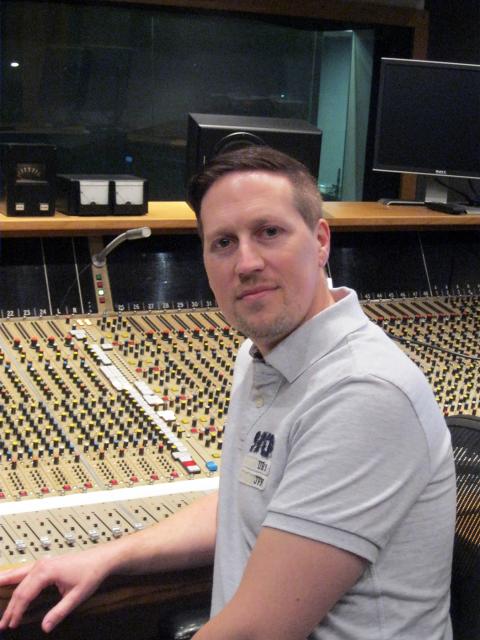Alumni Profile: Andrew Simon McAllister ’08

Andrew Simon McAllister
Mark Small
Growing up in Belfast, Northern Ireland, film composer Andrew Simon McAllister, was a child during “the troubles,” the sectarian fighting that flared there for a time.
“I remember being very young and going to the shopping area in the city center with my mother,” McAllister says with a distinctive brogue. “We had to go through turnstiles past soldiers holding machine guns. I remember holding very tightly to my mum’s hand as we went.” Given that backdrop, McAllister was an ideal choice to score the film 2014 film Shooting for Socrates, half of which was set in Northern Ireland.
“It’s a sports film about the Northern Ireland football team going to the Mexican World Cup to play Brazil in 1986 during the height of the troubles,” he says. “While the team was playing, there was no fighting in the streets, everyone was inside watching the game on TV. It brought the country together.”
In addition to his ability to write cues for violin, guitar, and flute with an Irish lilt as he did for Socrates, McAllister creates music in a range of styles for dramatic features, documentaries, and video games. His scores may feature full orchestra (Planet of the Apemen miniseries), solo piano and chamber ensemble (BBC World War I drama 37 Days), pop songs (MTV’s My Super Sweet 16), and electronically manipulated sounds. McAllister draws on his life experiences as well his musical and technical finesse to create the right atmosphere in the films he scores.
For years, McAllister has worked out of his home studio in Belfast where he lives with his wife and their two young children. He shuttles regularly to London for meetings and larger recording sessions at Air Edel, the production company that now represents him.
Raised in a musical family, McAllister grew up playing trumpet, cornet, and French horn before picking up the guitar at 11 years old. After graduating from high school, he earned a bachelor’s degree in electro-acoustic composition at Queens University in Belfast. “It was a good education, although I had always wanted to go to Berklee,” he says. “But there was no way my family could consider that when Queens University was free.”
For a time, he operated a small recording studio and was writing—as he terms it—“daft punk music” with his cousin, Nathan Connolly. After Connolly joined the successful Irish alternative rock band Snow Patrol, McAllister decided to go to Berklee. “I already had a degree from Queens University, but I got another from Berklee because there wasn’t a master’s program back then. Looking back, it was a good choice.”
McAllister received a performance scholarship as a guitar principal but soon changed his focus. “When I got to Berklee, I saw so many incredible players,” he recalls. He began practicing with such intensity that he developed hand problems. “At the same time I was getting high marks in the composition classes,” he relates, “and after taking the Introduction to Film Scoring class, I knew I really wanted to be a film scoring major.”
Upon graduating summa cum laude from Berklee in 2008, McAllister and his wife lived briefly in Los Angeles, where he gained experience writing for MTV, PBS documentaries, and other projects. “The MTV work came through a publishing company that was looking for songs for shows like My Super Sweet 16,” he says. “I still get royalties for some of the work I did there.”
After returning to Northern Ireland, McAllister endured serious health problems that lasted for a year. Once he recovered, he began visiting production companies seeking work. “Many were using library music rather than hiring a composer,” he says. “But I kept trying. When you’re starting out you’ll hear no a lot, so you have to have a thick skin.” After persistent effort, McAllister began writing for local programs and short films. Scoring three-episodes of the BBC miniseries Planet Earth: Planet of the Apemen, required nearly three hours of orchestral music. That was his first big project for the BBC, others would follow.
An admitted workaholic, McAllister is hands-on with the writing, engineering, and playing of some of the instruments for his scores. Until recently, he also handled the administration work. “I was wrangling with producers and directors about contracts and then trying to sit down and be musical,” he says. “That’s when I felt it was time to get an agent.” In November 2014, after his score for the BBC drama 37 Days was nominated for a Royal Television Society award, he signed with Air Edel.
He recently scored the independent film My Lonely Me, which has been nominated for a World Music and Independent Film Festival Award for best soundtrack. He’s also composing for the video game Mulbury Project by the developers of the popular Hitman and Hitman Resolutions games. His sonic palette has broadened since he began scoring. “It’s changed quite a lot since I left Berklee,” he says. “I was a big John Williams fan then, trying to write melodic orchestral cues. You can do many different things now.” For 37 Days, McAllister mixed big orchestral sounds with electronic e-pulse cues, and more.
Sometimes the film isn’t calling for a tuneful or feel-good score. McAllister used only guitar tracks and sounds he produced by rubbing and tapping glass for the score for The Healer.
For the forthcoming documentary Hostage to the Devil, about the life of Irish Catholic priest, author, and exorcist Malachi Martin, he deliberately created an unsettling score. “My cousin and I recorded hours of really weird and annoying noises and then I added orchestra and an opera singer. I wanted people to walk out of the cinema feeling glad they were out of there.” Whatever kind of soundtrack a film needs, McAllister will explore until he finds it.




